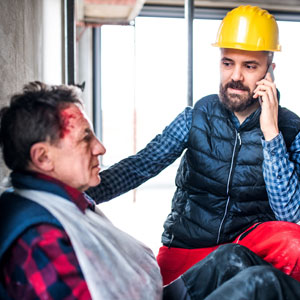Call For A Free Consultation
(631) 359-8016No Recovery, No Fee

Construction sites can be dangerous, and workers injured on the job have specific rights and options under Florida’s workers’ compensation laws. Understanding your rights after a Florida construction site injury is essential for getting the medical treatment and financial support you deserve. In this article, we’ll walk you through…
If you’re injured on a construction site in Florida, you should report the injury to your immediate supervisor as soon as possible. If the supervisor does not respond promptly, escalate the report to someone higher in the management hierarchy.
Florida law absolutely prohibits retaliation for filing a workers’ compensation claim. Under Florida Statute 440.205, employers cannot fire or treat an employee differently simply for filing a claim. If you do face retaliation, this is considered an independent tort that can be litigated outside of the workers’ compensation system in general civil court. Unlike in the workers’ compensation system, retaliation claims may allow you to recover non-economic damages such as emotional distress and even punitive damages under certain circumstances.
The timeline for reporting and filing workers’ compensation claims in Florida depends on the nature of the injury. For point-source trauma, like a nail puncture or fall, you must report the injury within 30 days. It’s best to report the injury immediately, as this strengthens your case. For exposure-type injuries, be it inhalation of toxic fumes or skin conditions caused by environmental exposure, you have 90 days to report the injury.
In Florida, workers’ compensation laws apply the same rules to all employees, including subcontractors and day laborers. If you’re covered under workers’ compensation, you’re entitled to the same rights and benefits as any other worker, regardless of whether you’re a permanent employee or a subcontractor.
In Florida, the calculation for lost wages depends on the extent of the injury. If a worker is completely unable to work, they receive two-thirds of their average weekly wage (AWW) for the period they are unable to work. On the other hand, if the worker can perform limited duties but earns less than 80% of their pre-injury wages, the employer is required to pay 80% of the wage gap.
For example, if a worker with a 20 pound lifting restriction cannot be accommodated by the employer, they will be paid 64% of their regular wages. If the employer can offer only limited work because of the restriction (e.g. 20 hours a week), the employer would be required to pay 80% of the difference between what the worker is earning and 80% of the preinjury wage.
For example, if an employee is earning $20.00 per hour and usually works 40 hours, but is only given 20 hours of work, the employee is due an additional $192.00. ($800.00 times .80 is $640.00, less $400.00, is $240.00 times .80 is $192.00)
While you do not need a lawyer if the employer’s insurance is fully cooperating, it’s always a good idea to consult with one. Most injured workers aren’t aware of the full range of benefits and compensation to which they may be entitled. Even if you believe everything is going smoothly, having a lawyer review your case can help ensure you’re receiving everything you’re owed. If everything is in order, great. If not, a lawyer can help you correct any issues before they become problems.
A key difference in construction site injuries is that Florida law requires all construction workers to be covered by workers’ compensation insurance, regardless of the number of employees in the company. Unlike most industries, where employers with fewer than four employees are exempt from providing workers’ compensation, construction employers must cover every worker engaged in construction unless the worker is the owner of a business and has opted for an exemption.
This means that construction workers are more likely to be covered by workers’ compensation but also face specific challenges, such as ensuring that subcontractors and temporary workers are included in coverage.
For more information on Florida construction site injuries, an initial consultation is your next best step. Get the information and legal answers you are seeking by calling (631) 359-8016 today.